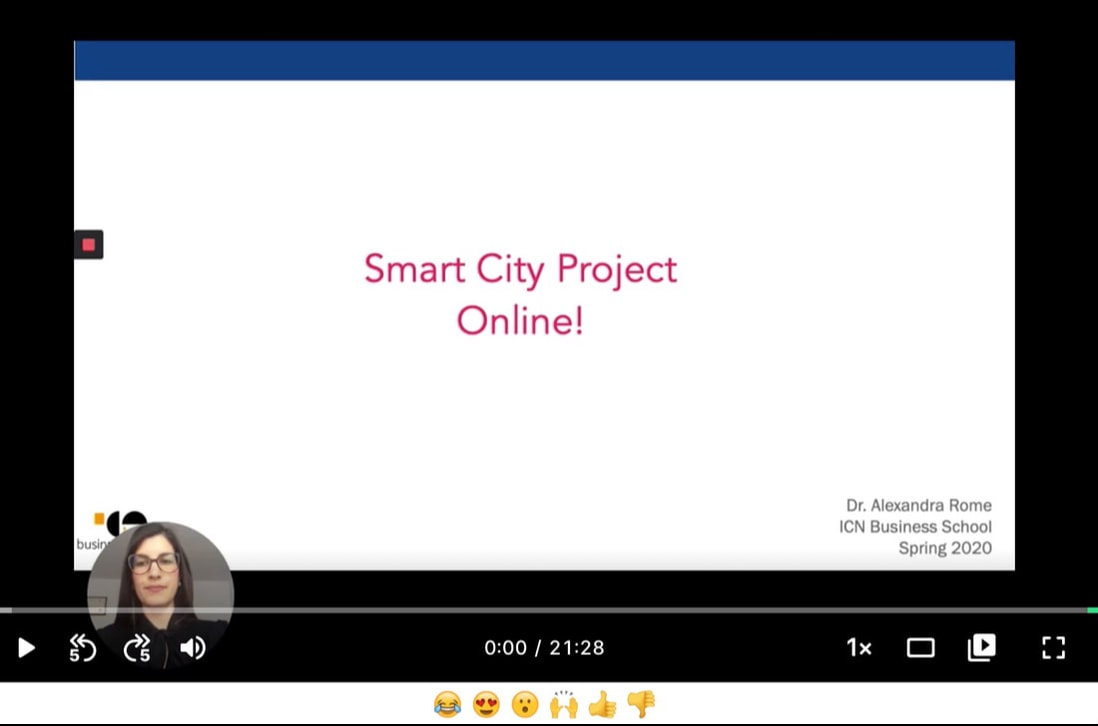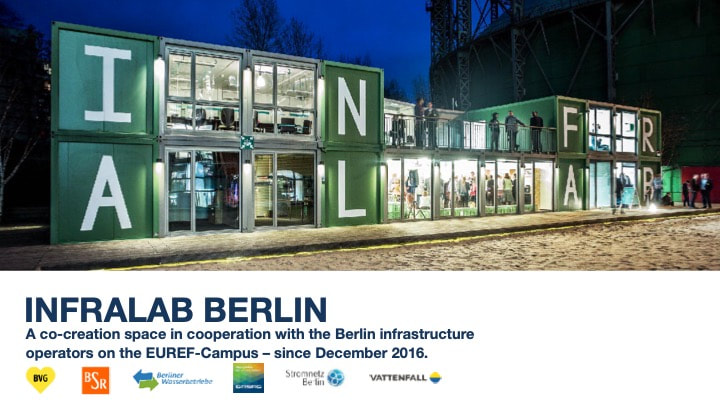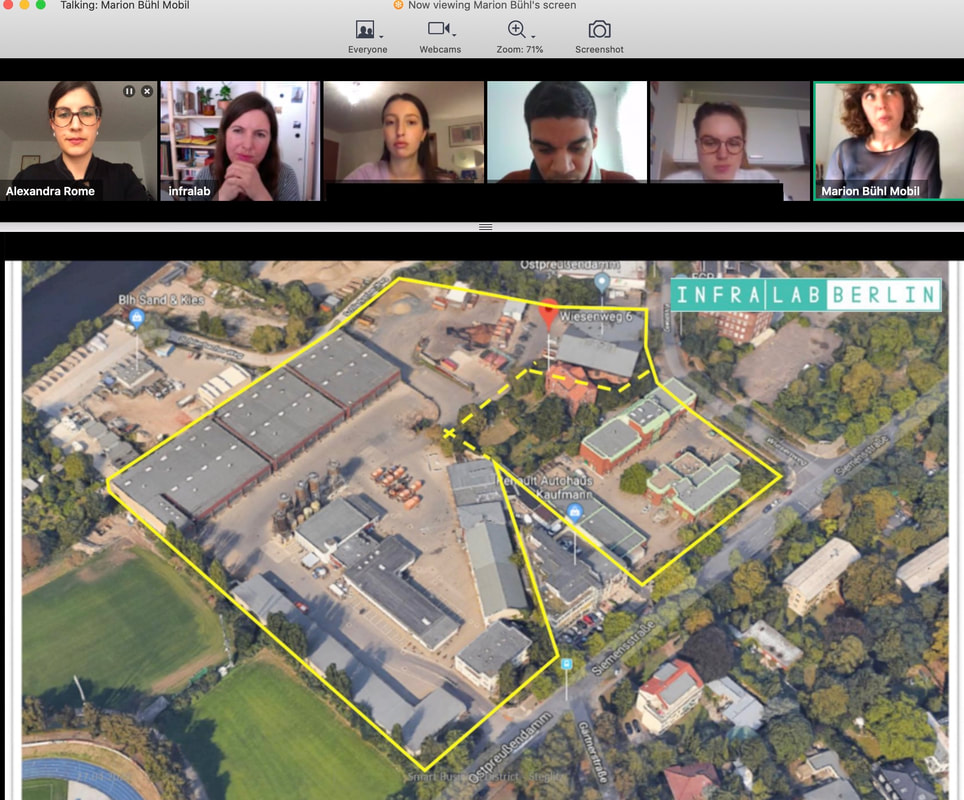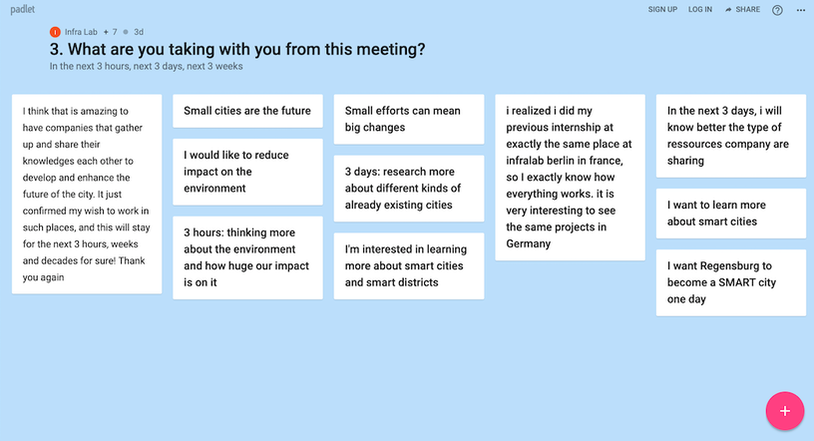Alexandra Rome - Personal Page
|
In light of COVID-19, which has forced students and teachers alike out of the classroom, we at ICN Business School have been thinking about new – and safe – ways to interact with each other as well industry professionals. At the outset of the crisis, many online learning platforms started offering free access to their services, which has been, on one hand a godsend (despite being a Millennial, I still seem to operate as a luddite when it comes to developing e-learning materials). On the other hand, this has proven challenging for cross-country teaching (China blocks many of these services) and can be overwhelming for students who are expected to download and acclimate to a series of new platforms. In any case, we’re making due! For the past three years, I’ve been running a course called ‘Smart City Projects’, where students work together with various municipal and industry professionals over an intensive week to propose an initiative that relates to one or more of the UN’s Sustainable Development Goals (SDGs) within Germany. While the past two years, students have focused on the city of Nuremberg (click here to read about our experiences in 2019), this year, students are turning their attention towards Berlin! To be sure, Berlin is well on its way to becoming a smart city. As of 2019, the city has more than 120 ongoing projects, including repair cafés, where people meet to repair broken things including clothes, furniture, electronic devices, and etc.; various initiatives focused on installing charging stations for e-cars, mobile devices, and even street lights; and organizations that facilitate cross-company cooperation focused on sustainable urban development. This month, ICN partnered with one such cooperation: InfraLab. Established in 2016, InfraLab is a joint think and work space that brings together partners who work across industries in order to develop innovative technologies and services that make Berlin more sustainable, livable, and smarter. Although they are known for hosting regular events including Hackathons, movie nights, start-up and networking events, our visit this April was entirely virtual! This meant that nearly 20 students – from all over the world – could come together and learn about the exciting initiatives and ongoing projects InfraLab supports. Focusing on smart cities, and in particular, smart business districts, Community Lead Anouk Haller and the energy manager/ industrial engineer at the Berlin Sanitation Service (BSR) Marion Bühl walked us through what it means to develop and maintain climate-friendly infrastructure using synergies resulting from the proximity of company locations, with the goals of reducing emissions, resource consumption, running costs, and the specific land consumption of individual companies. A few of us - those brave enough to use the video function - are featured below: We ended our virtual visit by overviewing our main takeaways – those points that will stick with us in the next three hours, three days, three weeks. Have a gander at what a few of the students came up with below! In times of crisis, innovation prevails.. In the context of sustainability, it’s interesting to think about how this might affect the health of our planet moving forward. Economic shutdowns and restrictions on non-essential travel have resulted in a notable deduction in both nitrogen dioxide and carbon dioxide emissions. But is this in and of itself sustainable? Will COVID-19 lead to a “new normal”? Or might we expect the demand for travel and business to bounce back to their pre-crisis levels once this pandemic is (we hope soon) a thing of the past? Will essential environmental initiatives end up taking a back seat in the coming months (possibly years) to allow countries to relaunch their economies? These are some of the topics I’m mulling over in my self-isolation- these- and of course, the many ways to avoid making a fool of myself whilst recording my lectures. Wish me luck.
0 Comments
|
Alexandra RomeI've been lucky enough to find a career that combines my love of traveling, passion for educating, and need to work in sweatpants at least 50% of the time (see I really am American). Archives
April 2020
Categories |
 RSS Feed
RSS Feed




